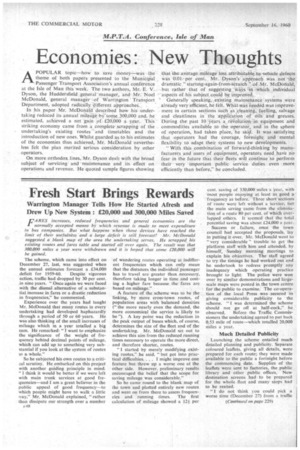Economies: New Thoughts
Page 138

If you've noticed an error in this article please click here to report it so we can fix it.
APOPULAR topic—how to save moneywas thetheme of both papers presented to the Munieitial . Passenger Transport Association's annual conference at the Isle of Man this week. The two authors, Mr.. E: V.
• Dyson, the Huddersfield general manager, and Mr: Noel McDonald, general manager-of Warrington Transport Department, adopted radically, different approaches. ,
In his paper Mr. McDonald described how his undertaking reduced its annual mileage bY-some „300,000 and he estimated, achieved a net gain pf..£20,000 a year. This striking economy came from a complete scrapping of the _ undertaking's existing routes and timetables and the introduction of new ones. Whilst guarded as to his estimates of the economies thus achieved, Mr. McDonald nevertheless felt the plan merited serious consideration by other operators.
On more orthodox lines, Mr. Dyson dealt with the broad subject of servicing and • maintenance and its effect on operations and revenue. He quoted sample figures showing
that The average .mileage lost attributable to -vehicle defects Was 0.01.per cent. Mr. Dyson's aPProach was not the dramatic." starting-again-from-Seratch " of Mr. McDonald, but rather that of suggesting :Ways in Which individual aspects of his subject could be improved.
' Generally speaking, existing maintenance systems were already very efficient, he felt. What was needed was improvement in certain sections such as cleaning, fuelling, salvage and cleanliness in the appltiation of oils and greases. During the past 10 'years a.„ revolution 'rn. equipment and commodities available to the 'operator, and in the sphere of operation, had taken place, he said. It was satisfying that operators had the courage, foresight and mental flexibility to adapt their systems to new developments.
" With this combination of forward-thinking by manufacturers and users of equipment, operators need have no fear in the future that their fleets will continue to perform their very important public service duties even more efficiently than before," he concluded,




































































































































































































































